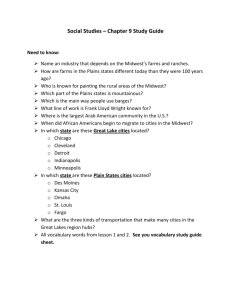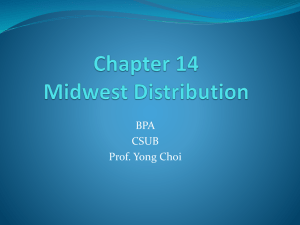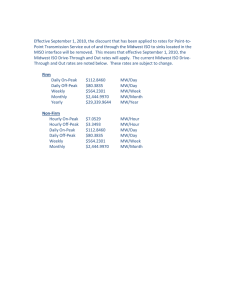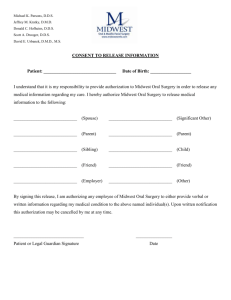Transition of Interconnection Requests from MEC to MISO Q&A
advertisement
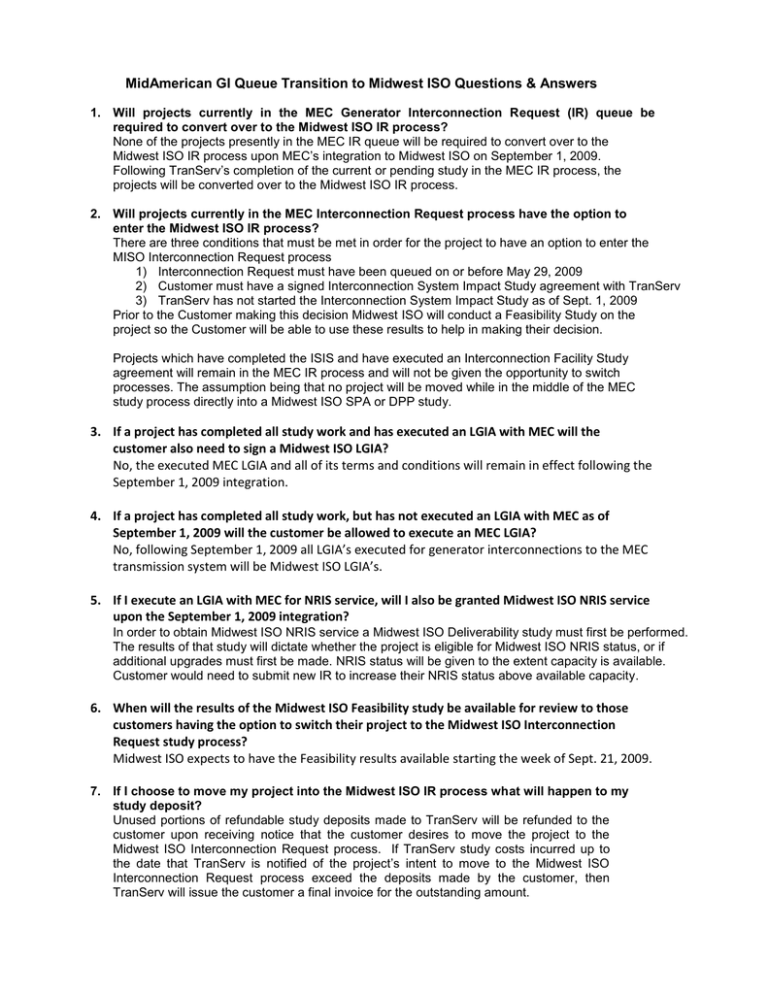
MidAmerican GI Queue Transition to Midwest ISO Questions & Answers 1. Will projects currently in the MEC Generator Interconnection Request (IR) queue be required to convert over to the Midwest ISO IR process? None of the projects presently in the MEC IR queue will be required to convert over to the Midwest ISO IR process upon MEC’s integration to Midwest ISO on September 1, 2009. Following TranServ’s completion of the current or pending study in the MEC IR process, the projects will be converted over to the Midwest ISO IR process. 2. Will projects currently in the MEC Interconnection Request process have the option to enter the Midwest ISO IR process? There are three conditions that must be met in order for the project to have an option to enter the MISO Interconnection Request process 1) Interconnection Request must have been queued on or before May 29, 2009 2) Customer must have a signed Interconnection System Impact Study agreement with TranServ 3) TranServ has not started the Interconnection System Impact Study as of Sept. 1, 2009 Prior to the Customer making this decision Midwest ISO will conduct a Feasibility Study on the project so the Customer will be able to use these results to help in making their decision. Projects which have completed the ISIS and have executed an Interconnection Facility Study agreement will remain in the MEC IR process and will not be given the opportunity to switch processes. The assumption being that no project will be moved while in the middle of the MEC study process directly into a Midwest ISO SPA or DPP study. 3. If a project has completed all study work and has executed an LGIA with MEC will the customer also need to sign a Midwest ISO LGIA? No, the executed MEC LGIA and all of its terms and conditions will remain in effect following the September 1, 2009 integration. 4. If a project has completed all study work, but has not executed an LGIA with MEC as of September 1, 2009 will the customer be allowed to execute an MEC LGIA? No, following September 1, 2009 all LGIA’s executed for generator interconnections to the MEC transmission system will be Midwest ISO LGIA’s. 5. If I execute an LGIA with MEC for NRIS service, will I also be granted Midwest ISO NRIS service upon the September 1, 2009 integration? In order to obtain Midwest ISO NRIS service a Midwest ISO Deliverability study must first be performed. The results of that study will dictate whether the project is eligible for Midwest ISO NRIS status, or if additional upgrades must first be made. NRIS status will be given to the extent capacity is available. Customer would need to submit new IR to increase their NRIS status above available capacity. 6. When will the results of the Midwest ISO Feasibility study be available for review to those customers having the option to switch their project to the Midwest ISO Interconnection Request study process? Midwest ISO expects to have the Feasibility results available starting the week of Sept. 21, 2009. 7. If I choose to move my project into the Midwest ISO IR process what will happen to my study deposit? Unused portions of refundable study deposits made to TranServ will be refunded to the customer upon receiving notice that the customer desires to move the project to the Midwest ISO Interconnection Request process. If TranServ study costs incurred up to the date that TranServ is notified of the project’s intent to move to the Midwest ISO Interconnection Request process exceed the deposits made by the customer, then TranServ will issue the customer a final invoice for the outstanding amount. 8. If I choose to move my project into the Midwest ISO IR process where will my project be placed in the studies? The answer to that depends upon the results of the Midwest ISO Feasibility Study and the ability of the customer to meet the Midwest ISO Interconnection Process Milestones and required Deposits. 9. If I choose to move my project into the Midwest ISO IR process will I have to submit a Midwest ISO Interconnection Request? No, the interconnection request submitted previously to TranServ will serve as the Midwest ISO request. To the extent that additional information is required by MISO the customer will be notified. 10. If I choose to move my project into the Midwest ISO IR process will I retain my original queue date? Yes, the queue date of the original request will be maintained as long as the customer is able to continue to meet the Milestones and required Deposits of Midwest ISO Interconnection Request process. It should be noted that under the Midwest ISO Interconnection Request process, queue date has much less significance. 11. What is a typical processing time through the Facility Study stage for a project that enters into the Midwest ISO Interconnection Request process at the SPA phase and at the DPP phase? Projects entering the Midwest ISO Interconnection Request process at the SPA phase can expect on average a total of 21 months from the start of the SPA through the completion of the Facility Study Projects entering the Midwest ISO Interconnection Request process at the DPP phase can expect on average a total of 9 months from the start of the SPA Review through the completion of the Facility Study 12. If I choose to move my project into the Midwest ISO IR process can I later choose to move back to the MEC IR process? No, once the project has been moved to the Midwest ISO Interconnection Request process the prior study agreement with TranServ will be terminated and will not be available to the project. 13. Will projects be allowed to remain in both the MEC and the MISO processes? No the project will either stay in the MEC Interconnection Process (through the completion of the pending study), or will move to the Midwest ISO Interconnection Request process. 14. When will projects currently further along in the MEC IR process be required to conform to the Midwest ISO Tariff? Following completion of the TranServ study under process or the pending TranServ study, the project will be transitioned to the Midwest ISO Interconnection Request process. 15. Post the 9/1/09 wills all new MEC IRs with POIs on Midwest ISO controlled transmission be conducted under the Midwest ISO process? Yes new requests will be required to submit IRs to Midwest ISO on a going forward bases. However projects connecting to the distribution network of MEC will continue to submit IRs to MEC.
